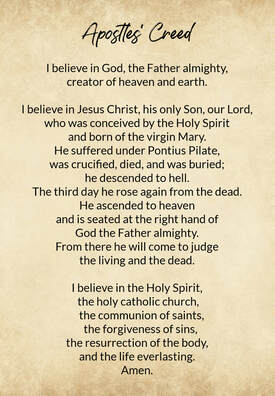 It is not uncommon for an individual to nod his head in approval all the way through from “I believe in God, the Father Almighty” to “I believe in the Holy Spirit,” only to apply the brakes halting at “the holy catholic church.” In his book Bowling Alone, Robert Putnam cites the decline of involvement in community activity. He uses bowling as an example where statistics show that while the number of bowlers remains steady, if not increases, the number of bowlers participating in leagues continues to decline. We, in many ways, are an individualistic society. We have taken “I did it my way” to the extreme. George Gallup, Jr. reported that “Americans are among the loneliest people in the world” (Stanley 22). Nevertheless, lonely or not, hundreds if not thousands of believers – not counting non-believers – ignore, avoid, and ridicule the Church. So, when we come to this point in the Creed, some choose to bail. Therefore, I aim this morning to speak to the value of the Church and to show why you need the church and why the Church needs you. Join me in exploring the nature of the Church. We will discover that the Church is . . . 1. Christ’s Church Matthew records the very first mention of the Church. Appropriately, Jesus spoke the first word on the church.
Simon Peter’s shining moment precedes these verses. He shines as he confesses his understanding of his Teacher’s identity – “You are the Christ, the Son of the living God.” Following that correct and God-inspired response, Jesus dubs Simon “the Rock.” Upon that great confession and upon the one who spoke it, Christ promises to build. Notice what He will build: “my church.” The Church belongs to Jesus. As the founder, Christ starts with Simon the Rock and begins to stack stones. What are those stones? Well, it is interesting that if we look through all the New Testament from Matthew to Revelation, we will find no mention of building a church building. So, what are the stones? Peter, the first Rock, explained this best.
If anyone has described you as thick-headed, maybe that is because you are a stone! Addressing us, the living stones, R. T. France writes:
Now that we have established the substance of the church, we need to assess the strength. Will the Church, made of flawed bricks, withstand the earthquake, the flood, the tsunami, the fights, the gossip, the pettiness, the troubles? We find the answer in verse 18 – “the gates of Hades will not overcome it.” France says, "The imagery is rather of death being unable to swallow up the new community which Jesus is building. It will never be destroyed." (NICNT 625) The Church will survive. We have no control over that. We do, however, have input in determining if the Church will thrive.
In our words and behavior may we honor the Lord of the House. We also see the Church as the . . . 2. Holy Church
When we reclaim and/or discover the truth of God’s majesty and holiness, we will grasp why the Church must be holy, or in the Latin Creed, “sancta ecclesia.”
Luther from the 1500s nor Barth from the 1900s originated this idea. In fact, we can trace the message of God’s holiness back to Genesis. Yet, perhaps, the first Rock himself said it best:
Are you strange? Note, I did not ask if you are weird. I asked if you are strange. In other words, do you stand out in your faith, or do you blend in so well to the culture that no one could guess you identify yourself with Christ? The Church is a gathering of strangers, not strangers to one another, but strangers to the world. Notice, however, that “strangers” does not imply detachment. verse 12 - "among the pagans” Just as Jesus, Holiness Incarnate, loved the prostitute and the tax collector, you too, while striving for holiness, are to love the “worldly.” The Church is Christ’s and Holy; it is also the . . . 3. Catholic Church
“catholic not Catholic” We are part of the catholic Church in that we are: Universal and Unified
The Church is Christ’s, Holy, Catholic and it is the . . . 4. Local Church We do a disservice to God’s created assembly when we view the Church as the universal church alone. It is also local. The Church, while remaining one, exists in a concrete, local congregation.
I am glad that Church is much more and much clearer than “some sort of Cloud-cuckooland.” Within the opening of any of Paul’s letters in the New Testament one will see a local body or bodies addressed. Take the second letter to Thessalonica as an example:
Following the New Testament example, we identify ourselves as a local church as part of the Universal Church. We at Rabbit Creek Church (the church I pastor) are the Church. The Church is Christ’s, Holy, Catholic, Local and . . . 5. Called-Out
For sure, that early band of believers struggled – struggled physically, emotionally, financially, and spiritually – struggled even unto death. Yet, they persevered. Studdert Kennedy correctly identifies their source of courage – “He was in it.” Where did he get such an idea?
#ordinarylives
For further reading: Bainton, Roland H. The Reformation of the Sixteenth Century. Boston: Beacon Press, 1985. Barth, Karl. Dogmatics in Outline. New York: Harper & Row, 1959. France, R.T. The Gospel of Matthew - The New International Commentary on the New Testament. Grand Rapids: Eerdmans, 2007. Putnam, Robert. Bowling Alone. New York: Simon & Schuster, 2000. Stanley, Andy and Bill Willits. Creating Community. Sisters, OR: Multnomah, 2004. Studdert Kennedy, G.A. I Believe (Sermons on the Apostles’ Creed). Garden City, NY: Doubleday, 1928. Tozer, A.W. The Pursuit of God. Camp Hill, PA: Christian Publications, 1997.
0 Comments
Leave a Reply. |
Archives
October 2023
|
 RSS Feed
RSS Feed